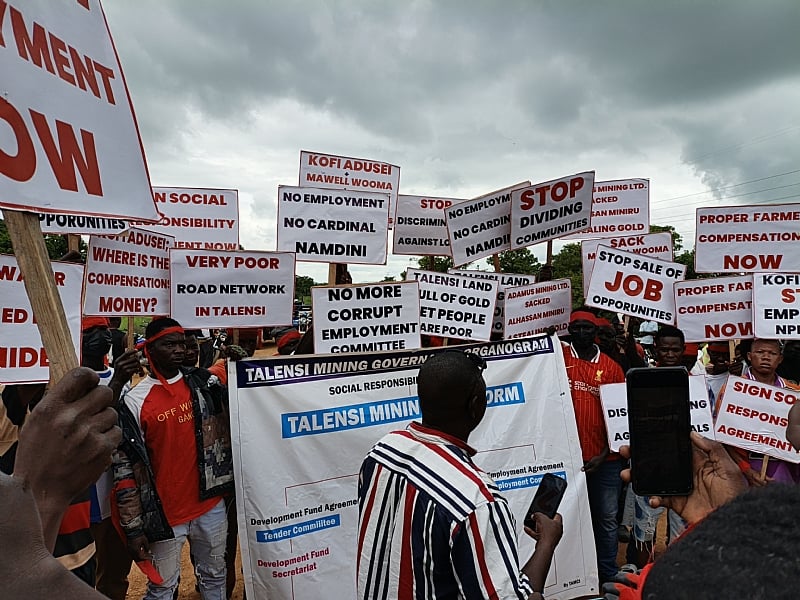The simmering discontent among residents of the Talensi District in Ghana’s Upper East Region finally boiled over on August 30, 2025, as they took to the streets in a massive demonstration against the Cardinal Namdini Mining Company. The protest, a vibrant display of community solidarity, particularly among the youth, underscored the deep-seated grievances against the mining company, which residents accused of prioritizing profit over their well-being. The core issues revolved around allegations of exploitation, neglect, and a blatant disregard for the community’s welfare since the inception of mining operations. The demonstrators presented a petition outlining their demands and grievances, accusing the company of a litany of offenses ranging from environmental damage and paltry compensation to a lack of transparency and meaningful community engagement.
Central to the residents’ complaints was the devastating impact of the mining activities on their environment and livelihoods. The petition highlighted the pollution of water sources, the destruction of fertile farmland—the lifeblood of the community—and the rise in health problems attributed to dust and chemical exposure. These environmental consequences, coupled with inadequate compensation for the loss of their land and livelihoods, fueled the residents’ anger and frustration. Mr. Albert Landolba, speaking on behalf of the demonstrators, emphasized the fundamental principle that the welfare of the people should supersede corporate profits, urging the company to embrace transparency and accountability in its operations. He painted a grim picture of the hardships endured by the community, hardships that they felt were directly linked to the mining company’s activities and its alleged disregard for their well-being.
The petition served as a comprehensive indictment of Cardinal Namdini Mining Company’s operations, calling for a significant shift in its approach to community relations and its responsibilities toward the people of Talensi. The demands included a commitment to fulfilling its corporate social responsibility obligations by investing in crucial sectors such as education, healthcare, infrastructure development, and local employment. The demonstrators also called for the dissolution of the existing employment committee, alleging unfair practices, and demanded the establishment of a formal agreement with community leaders to ensure their voices were heard and their interests protected. Furthermore, they pressed for a review of the existing compensation packages, deeming them inadequate for the losses incurred, and demanded the dismissal of specific senior staff members, including Emmanuel Kofi Adusei, holding them accountable for the perceived injustices.
The lack of employment opportunities for local residents, despite the presence of a large-scale mining operation, was another significant grievance fueling the protest. Mr. Bugre Samuel Sapak, a member of the affected communities, articulated the community’s frustration, contrasting their experience with that of other mining communities that had benefited from employment opportunities generated by similar projects. He argued that the Talensi residents were being unfairly marginalized and denied their rightful share of the benefits derived from their land. His statement, “We expect the company to give back to our communities, it’s our right, the land belongs to us,” encapsulated the sentiment of ownership and the expectation of reciprocal benefit from the mining company.
Adding to the list of grievances was a growing concern about the deteriorating security situation in the area. Residents linked the rise in robberies and other criminal activities to the influx of people associated with the mining operations. They recounted experiences of being targeted by criminals, highlighting the vulnerability they felt and the fear that had gripped the community. The testimonies of residents being robbed of their money, phones, and valuables on a daily basis painted a disturbing picture of lawlessness and underscored the perceived failure of the company to contribute to the safety and security of the communities in which it operates.
The demonstration concluded with a call for meaningful dialogue between Cardinal Namdini Mining Company and the affected communities. The residents expressed their desire for a constructive engagement that would lead to mutually beneficial solutions, acknowledging the need for a balance between the company’s operations and the community’s well-being. However, the demonstrators also made it clear that their peaceful protest was not a one-off event. They vowed to continue their advocacy and pressure the company until their grievances were addressed and the mining company fulfilled its obligations to the community. The demonstration served as a powerful message of unity and resilience, a testament to the community’s determination to fight for their rights and secure a better future for themselves and their children.


